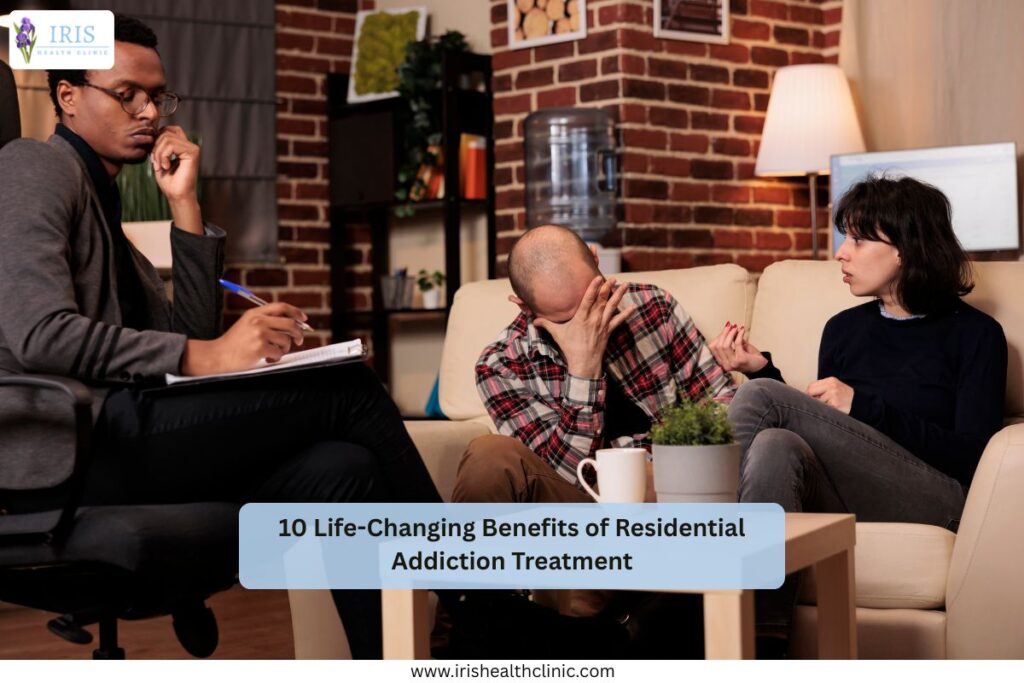To transition from addiction, individuals strive for outpatient care, self-help, or short detoxes. However, when a much deeper and immersive level of treatment is required, residential addiction treatment usually could become a turning point in recovery.
Either you yourself confront an addiction problem, stigmatizing your own concern for a loved one, or you are at the sidelines exploring treatment options, it is crucial to understand the immensely life-transforming effects of residential rehab.
Here are 10 life-changing benefits of residential addiction treatment that can anchor the long-term recovery:
1. Provided 24-Hour Support and Supervision
There will be round-the-clock access to doctors, therapists, and peer support during residential addiction treatment. Withdrawal, mental health crises, or just a tough day-there is always someone there to help. The early stages of recovery are considered the most vulnerable period, so a safety net can be a huge difference.
2. Structured, Distraction-Free Setting
Residential treatment programs offer clients a habitat where recovery is the only focus. With a substance-free, controlled, and secure surrounding, clients can refine their foundation with very few distractions, free of any everyday triggers or stress factors, and have the opportunity to heal.
3. Personally Tailored Treatment Plans
The personal experiences and journeys related to addiction are different for everyone. The best residential facilities know this, therefore their care delivery should be individualized, making an effort to match your preferences. Depending on your challenges, such as co-occurring mental health conditions, trauma, chronic pain, issues with identity, or if you simply suffer from depression or PTSD, the treatment plans will be modified for you specifically.
4. Integrated Mental Health With Addiction Care
Many people who experience addiction have a mental health disorder as well; this can be especially overwhelming. A residential setting will often implement dual diagnosis treatment so that you are dealing with your anxiety and depression, your trauma, or your bipolar disorder, simultaneous to your substance use not after.

5. Peer Connection and Community
Another healing component of residential rehabilitation is an important opportunity to connect with other individuals who really relate to where you are. In addition to group therapy, shared activities, and interactions as part of daily living, all caregivers encourage meaningful social connections to reduce the isolation that oftentimes accompanies addiction.
6. Daily Routine That Promotes Stability
A daily schedule in residential care almost always involves therapy, exercise, rest, nutrition, and reflection. From here, one can find reacclimation toward balance, retrain away from their old brain and body, and create new, healthier habits that promote full-time recovery.
7. Holistic Healing Approaches
Other residential addiction treatment programs also provide holistic interventions like yoga, mindfulness, art therapy, equine-assisted therapy, or fitness coaching. These services enhance mind and body healing, emotional stability, and inner serenity, all of which are essential elements for long-term sobriety.
8. Family Involvement and Healing
It is considered an addiction of the whole family, not just an individual. Many residential centers conduct family therapy, education, and support groups so that those that have been affected can process their own experiences and rebuild trust while learning to support recovery without enabling harmful behaviors.
9. Relapse Prevention:
As you finish residential addiction treatment, you will collaborate with counselors to create an aftercare and relapse prevention plan. This typically involves recommendations for outpatient treatment, sober living, support groups, and coping skills based on your needs and challenges.
10. An Actual Chance at Long-Term Change
Perhaps the most powerful advantage of residential addiction treatment, is hope. Many individuals are given the experience and sense of being heard, seen, and supported for the first time. With structure, time, and kindness, residential treatment enables individuals to reclaim their identity, restore self-esteem, and build a life worth living without alcohol and drugs.
Final Thoughts
Residential rehab for addiction isn’t about how to get out of drugs or alcohol; it’s about rebuilding your entire life from the inside out. If you or a loved one is fighting, just know that recovery is possible and generally begins with having the courage to say, “I need help.”
Ready to Find Out More?
If you are considering residential addiction treatment, or want to speak to someone about your treatment options, reach out to www.irishealthclinic.com, your resource for understanding the whole picture of addiction and mental health.

